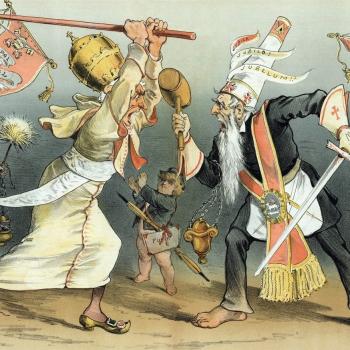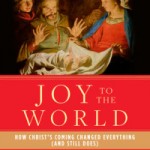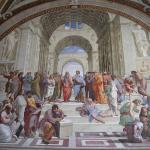Grazie Pozo Christie is a diagnostic radiologist in south Florida who loves her Catholic faith and loves the first pope from the Americas and the evangelical opportunities his popularity has given Catholics in the last year. A Hispanic wife and mother and fellow with the Catholic Association, she talks a bit about the past year with Pope Francis. (Full disclosure: She has also been through a Catholic Voices USA communications weekend, where I am a founding director.)
Is it significant that we’ve seen the Church through a man from South America this year? What’s different and important about this aspect of Pope Francis?
GRAZIE POZO CHRISTIE: Very significant. He is very much a man of his culture, which is warm, urgent, and emphatic, less “P.C” than American culture. My American husband is always shocked at how frank we Latinos are, about all sorts of things that in his culture are taboo subjects. I think we give each other more room to be spontaneous and open. I see that very much in Pope Francis. And it’s a spontaneity that is always coupled with a warm affection, the kind that invites hugs, the kind of hug you hunger for after a long journey.
Is there something of a Hispanic father to him that is important in understanding what he is modeling?
CHRISTIE: I think he carries himself like a Hispanic father, totally approachable, totally “a su servicio — at your service. It’s a kind of gentlemanly generosity that is so recognizable to Hispanics, the generosity of a man who could never sit while a woman or older man is standing, or drive by someone trudging in the rain without stopping and offering a ride. A generosity that doesn’t stand on its own dignity, a magnanimity.
What is the lesson about the Christian life Pope Francis is teaching you?
CHRISTIE: He is teaching me to have the courage to transmit the joy of the Gospel, without thinking of my own needs and my own fears. He is teaching me to avoid a bunker mentality that is so easy to assume when the general culture seems so antagonistic to our beliefs. The great thing is that he is teaching us by example.
What is it that is so overwhelming about him, that has caught the attention of everyone from Time to Rolling Stone?
CHRISTIE: It has to be his radical humility. He has dispensed with layers of formality that have surrounded the papacy and carries himself with the perfect simplicity of one who knows himself a child of God, no more and no less.
Is there a danger that the story has become about him and not Christ?
CHRISTIE: No, I don’t think so. His humility protects him from the kind of hubris that could lead to that. He will always point to Christ as the originator of all that is of any value in him.
What does Pope Francis, a year in, mean for women?
CHRISTIE: Pope Francis has indicated that there is a need in the Church for a deepening and broadening of what he’s called the “theology of women.” There is a “feminine genius” that is only partially understood and exploited, in the Church. It is not enough for women to have important roles, like the president of Caritas. We have to understand what it means that the Church herself is feminine, and that the Virgin Mary is the first amongst the apostles. I’m not sure where this is leading, but I know that it will be beautiful.
As someone who is pro-life and feels strongly about marriage being between a man and a woman, does anything he’s had to say scare you?
CHRISTIE: No. What scares me sometimes is way his message sometimes gets confused and transmitted by the mainstream media, so that the first thing I hear when I read the morning news is a garbled version, which always seeks to imply that Church doctrine is changing. There is a lot of wishful thinking out there, but Pope Francis always speaks very clearly on the subject. “Marriage is between one man and one woman,” he has said. And he has spoken very strongly on the humanity and dignity of the unborn child.
That said: I think he will continue to phrase things in a way which invites discussion, even in circles that are naturally antagonistic to the Church. This is good. This is pastoral. This is something we all have to consider doing more of. Out of the bunkers!
How does he challenge you?
CHRISTIE: I think he asks faithful Catholics to live more “outwardly,” and to cleave less to our comfortable circles. He wants us to go out to the crossroads and find people who need God, and bring them home. That is quite a challenge.
Following his lead, how can Catholics better communicate on life and marriage? On some of the issues that can be so tough and divisive?
CHRISTIE: He is very careful to put the central “yes” of Christianity first. The “yes” is the awesome truth that God loves each and every one of us and is full of mercy toward us, no matter what our condition. Proposing and explaining that truth has to come first, before doctrinal matters that are tough and divisive, precisely because we can never understand the doctrine if we don’t understand the way God loves us. I do believe that all of us, even lay Catholics, have to take that lead and embark on a new kind of evangelization, in our limited spheres.
What are your hopes for the upcoming synod on the family?
CHRISTIE: I hope that the participants will find better ways for the Church to attend to the great needs of the modern family, which is broken like never before. So many people do not even understand the meaning of family any more. Our pastors have to find ways to care for our families as they exist today and to help them grow closer and stronger.
Is there a line or lesson from Pope Francis in the last year that you find unforgettable?
CHRISTIE: “I am a child of the Church!”
The president of the United States will be visiting with Pope Francis this month. What would be a good, inviting message for Americans to consider while watching any coverage of it?
CHRISTIE: It would be wonderful if Americans could understand in a new and fresh way how important it is to leave room in the public square for religion and rights of conscience. Watching President Obama be respectful to, and impressed by, Pope Francis I pray will have that effect.
Religious liberty will be discussed at the Supreme Court soon, too. That Hobby Lobby case and so many similar questions of conscience seem so misunderstood. Is that because people truly living their faith has become a somewhat exotic concept?
CHRISTIE: I think that is part of it. Also there is a complacency in our society, because we have depended on our basic freedoms being there, sort of automatically, without our having to fight — or even work much — for them. Now that traditional religious values are no longer mainstream, we have become aware of how tenuous our hold on religious liberty in truth might be.
LOPEZ: What are you most grateful for, as you reflect on a year with Pope Francis?
CHRISTIE: Firstly, I am grateful that he has been so kind about Pope Emeritus Benedict, calling on him as a grandfather and keeping him very much in his heart and in his words. I was very sad when Benedict retired, thinking how he must have suffered and struggled with that decision. Also, I am grateful that Pope Francis is different, and blows a whole new wind through our Church. Not because I prefer him to Benedict, but because I’ve learned just how a new way of looking at things or approaching a problem can fill me with new energy and excitement, just when things look most dim.

















